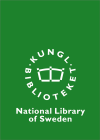From text to data – new ways of
reading
A conference at the National Library of Sweden
The title of this conference indicates the underlying two-fold goals for the event. One intention is to preach the potential in language technology and text analysis tools for researchers in humanities and social sciences. Another intention is to demonstrate to the institutions within the heritage sector (Archives, Libraries and Museums) the huge research opportunities and potentials they can support by making their resources available in open and digital format, accessible for language-based analysis.
We will not go into the actual tech/programming/computational linguistic angle of this, as the idea is more to stress the usefulness of the tools and methods to people who are not very familiar with programming, language models or how to analyze large textual corpora. As you all well know, with language technology and text analysis tools you can do what you’ve always done, only faster and easier, but you can also do things that no one would have thought possible just some decades ago.
The event is co-arranged by the National Library of Sweden, the National Archives and Swe-Clarin, a language technology consortium aiming to build an infrastructure to support humanities and social sciences with tech, tools and methods for scholars to find new paths in their respective fields. The idea with the conference is to take a further step from earlier national seminars on the use/value of digital culture as Digital Paths to the Collections (2015) and Digital Humanities in Archives & Libraries (2016).
This conference will provide an opportunity to meet scholars that, although representing a wide range of research interests, share the focus on text as data. The presentations will be of great interest for researchers within the humanities and social sciences as well as archivists, librarians and curators who manage collections at our heritage institutions, collections whose research potential might be further increased by the digital format.
Day 1 - Thursday, 7th February
|
12:30 - 13:00
|
Registration
|
|
13:00 - 13:15
|
Welcome
Gunilla Herdenberg, National Librarian Rolf Källman, Head of Department, The Swedish National Archives |
|
13:15 - 14:00
|
Who belongs? Reading identity, ownership, and legitimacy
Tim Sheratt, Associate Professor of Digital Heritage, University of Canberra |
|
14:00 - 14:45
|
How are we reading texts and for what purpose? How do the tasks language technology is built for fit the needs of digital humanities?
Jussi Karlgren, Adjunct Professor of Language Technology, Royal Institute of Technology, Stockholm |
|
14:45 - 15:15
|
Coffee
|
|
15:15 - 16:00
|
Crowdsourcing for text transcription, challenges & opportunities
Melissa Terras, Professor of Digital Cultural Heritage, University of Edinburgh
|
|
16:00 - 16:45
|
When the Humanities Went Digital (A History of Technology Told in the Future Tense)
Finn Arne Jørgensen, Professor of Environmental History, University of Stavanger |
|
End of day 1
|
Day 2 - Friday, 8th February
|
09:30 - 10:00
|
Coffee
|
|
10:00 - 10:45
|
Life Writes Its Own Stories: The value and research benefits gained from digitised newspaper collections
Simon Tanner, Professor of Digital Cultural Heritage, Kings College |
|
10:45 - 11:30
|
Probabilistic programming problems with prose (and other text)
Måns Magnusson, Researcher, Dpt of Computer Science, Aalto university |
|
11:30 - 13:00
|
Lunch
|
|
13:00 - 13:45
|
The life and lessons of a library lab – the case of the KB Lab
Lotte Wilms, Digital Scholarship Advisor, KB lab, the Hague |
|
13:45 - 14:30
|
On Trying to Set Up Long-Term Cross-Institutional Service Infrastructures with Short-Term Funding
Wout Dillen, UAntwerp Coordinator for CLARIAH-VL, University of Antwerp |
|
14:30 - 15:15
|
Concluding reflections/extended conversation
Patrik Svensson, Visiting Professor of Digital Humanities, UCLA |
|
Moderator: Johanna Berg, Project Manager, världskulturmuseerna
The conference is held in English |


